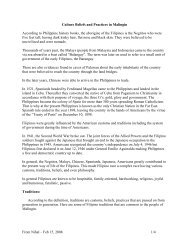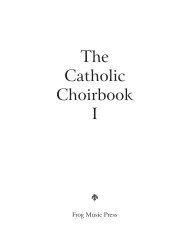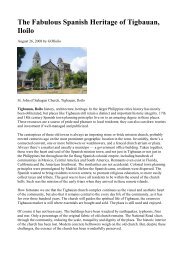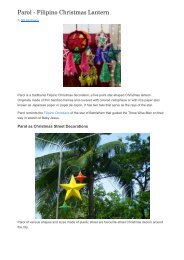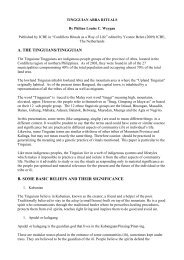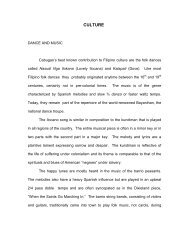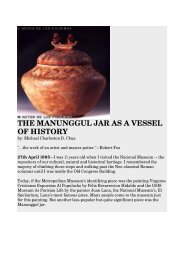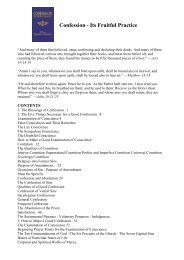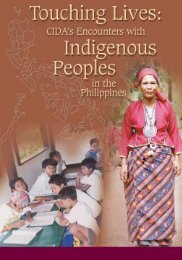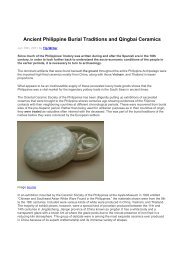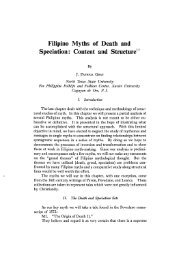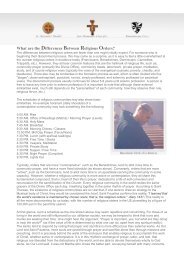Notes on Cebuano-Bisayan Ethnic Identity in the ... - AboutPhilippines
Notes on Cebuano-Bisayan Ethnic Identity in the ... - AboutPhilippines
Notes on Cebuano-Bisayan Ethnic Identity in the ... - AboutPhilippines
You also want an ePaper? Increase the reach of your titles
YUMPU automatically turns print PDFs into web optimized ePapers that Google loves.
Kobari/<str<strong>on</strong>g>Notes</str<strong>on</strong>g> <strong>on</strong> <strong>Cebuano</strong><strong>Bisayan</strong> <strong>Ethnic</strong> Indentity<br />
Mojares (2001) depicts <strong>Cebuano</strong> (Sugban<strong>on</strong>) ethnic category as a historical artifact as<br />
below:<br />
There was a time when it effectively subsumed under <strong>the</strong> more general category<br />
of “Visayan” and, <strong>in</strong> many c<strong>on</strong>texts today, it may be less mean<strong>in</strong>gful than <strong>the</strong><br />
label “Filip<strong>in</strong>o.” Moreover, <strong>the</strong> territorial dispersi<strong>on</strong> of <strong>Cebuano</strong>s is such that<br />
<strong>Cebuano</strong> who have relocated to, say, M<strong>in</strong>danao or Metro Manila may have<br />
assumed under newer cultural identities. With<strong>in</strong> Cebu itself, <strong>the</strong>re are dist<strong>in</strong>cti<strong>on</strong>s<br />
to be made al<strong>on</strong>g l<strong>in</strong>es of social class, occupati<strong>on</strong>al group<strong>in</strong>gs, or locati<strong>on</strong>.<br />
Yet <strong>the</strong> idea of a “<strong>Cebuano</strong> identity” rema<strong>in</strong>s persuasive. Its obvious hallmarks<br />
are language (Suguban<strong>on</strong>), local residence, or orientati<strong>on</strong> of Cebu prov<strong>in</strong>ce as a<br />
cultural or sentimental “homeland.” It is nourished <strong>in</strong> shared cultural memories –<br />
history, music, literature, rituals, popular arts – and draws its typicality from such<br />
formative facts as envir<strong>on</strong>ment, subsistence patterns, social organizati<strong>on</strong>, and<br />
political experience. (p.30)<br />
Manila now has its status as <strong>the</strong> capital city and <strong>the</strong> center of politics and<br />
ec<strong>on</strong>omics whereas Cebu is characterized as <strong>the</strong> seat of Christianity and a symbolic place<br />
of oppositi<strong>on</strong> to foreign dom<strong>in</strong>ati<strong>on</strong> with <strong>the</strong> name of K<strong>in</strong>g LapuLapu. In additi<strong>on</strong>, Cebu<br />
currently holds <strong>the</strong> 2 nd biggest city next to Manila with high socioec<strong>on</strong>omic growth as <strong>the</strong><br />
trad<strong>in</strong>g center as well as higher educati<strong>on</strong> <strong>in</strong> <strong>the</strong> central and sou<strong>the</strong>rn Philipp<strong>in</strong>es. The<br />
<strong>in</strong>ternati<strong>on</strong>al port and airport accelerate its ec<strong>on</strong>omic growth <strong>in</strong> trad<strong>in</strong>g and attract foreign<br />
tourists as well. The surge of Cebu as an <strong>in</strong>dustrialize<strong>in</strong>g trade and service center created<br />
a compound word, “Ceboom”, and gave <strong>the</strong> city ano<strong>the</strong>r label, “Queen City of <strong>the</strong> South.”<br />
Sometimes, <strong>the</strong> awareness of “we”“o<strong>the</strong>rs” dichotomy is directly reflected <strong>on</strong><br />
l<strong>in</strong>guistic issues. S<strong>in</strong>ce <strong>in</strong>dependence of <strong>the</strong> Philipp<strong>in</strong>es, <strong>the</strong>re were language problems <strong>in</strong><br />
<strong>the</strong> selecti<strong>on</strong> and formati<strong>on</strong> of a nati<strong>on</strong>al language (Tagalog, Pilip<strong>in</strong>o and Filip<strong>in</strong>o 5 ) and<br />
regi<strong>on</strong>al ethnic c<strong>on</strong>flicts <strong>in</strong> pursuit of balanc<strong>in</strong>g ec<strong>on</strong>omic and political relati<strong>on</strong>s with<strong>in</strong><br />
<strong>the</strong> state. <strong>Cebuano</strong>s do not oppose to <strong>the</strong> idea of “be<strong>in</strong>g Filip<strong>in</strong>os”, but to <strong>the</strong> decisi<strong>on</strong> that<br />
Tagalog, <strong>on</strong>e of <strong>the</strong> vernacular languages, serves as a nati<strong>on</strong>al language or <strong>the</strong> basis of a<br />
nati<strong>on</strong>al language <strong>in</strong> large part. Beh<strong>in</strong>d <strong>the</strong>se movements, people <strong>in</strong> <strong>the</strong> prov<strong>in</strong>ces<br />
recognize some implied possibilities that a nati<strong>on</strong>al language ideology does not allow<br />
n<strong>on</strong>Tagalogs to reta<strong>in</strong> l<strong>in</strong>guistic diversities under hegem<strong>on</strong>ic power of Manila and react<br />
aggressively to <strong>the</strong> idea of a Tagalog(based) nati<strong>on</strong>al language with great political and<br />
ec<strong>on</strong>omic dom<strong>in</strong>ance of Tagalog ethnic group. Emergence of Tagalog(based) nati<strong>on</strong>al<br />
language with higher hegem<strong>on</strong>ic power as <strong>the</strong> standard created a sense of feel<strong>in</strong>g that n<strong>on</strong><br />
Tagalogs are “sec<strong>on</strong>d class citizens” and <strong>Cebuano</strong>s gave severe critics to this phenomen<strong>on</strong><br />
as a “forth col<strong>on</strong>izati<strong>on</strong>” (Tiempo, 1981) by Tagalogs (followed by Spaniards, Americans<br />
and Japanese).<br />
There are ethnic tensi<strong>on</strong>s am<strong>on</strong>g regi<strong>on</strong>al communities beh<strong>in</strong>d <strong>the</strong>ir reacti<strong>on</strong> to<br />
<strong>the</strong> issues of a nati<strong>on</strong>al language. <strong>Cebuano</strong> politicians regarded <strong>the</strong> nati<strong>on</strong>al language<br />
9 th Philipp<strong>in</strong>e L<strong>in</strong>guistics C<strong>on</strong>gress (2527 January 2006)<br />
Organized by <strong>the</strong> Department of L<strong>in</strong>guistics, University of <strong>the</strong> Philipp<strong>in</strong>es<br />
8



